Many of us are looking for alternatives to refined sugar in the quest for healthier eating. While satisfying our sweet cravings is essential, it’s equally crucial to do so in a way that doesn’t compromise our health. Natural sweeteners are the perfect solution to this dilemma. Not only do they provide sweetness, but they also offer a range of health benefits.
This blog will explore a handy list of natural sweeteners for healthier cooking and determine which natural sweetener is the best for you.
Honey
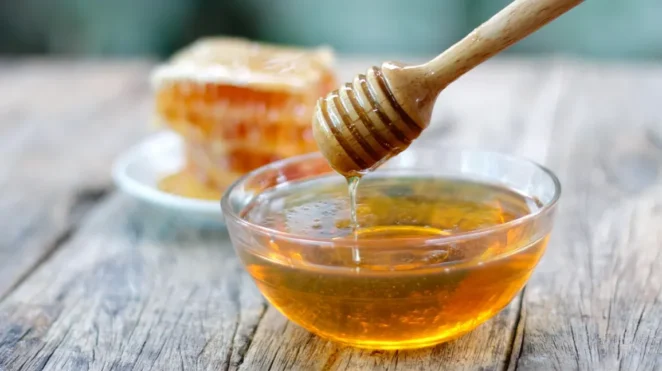
Honey is a natural sweetener. It has been used for centuries and offers a unique flavor profile that can enhance both sweet and savory dishes. Honey contains antioxidants and antimicrobial properties, making it a sweetener and a potential health booster. However, using honey in moderation is essential due to its high fructose content.
Maple Syrup
Maple syrup is a classic natural sweetener that adds a rich, earthy sweetness to your dishes. It’s particularly famous as a topping for pancakes and waffles. Still, it can also be used in baking, marinades, and glazes.
Agave Nectar
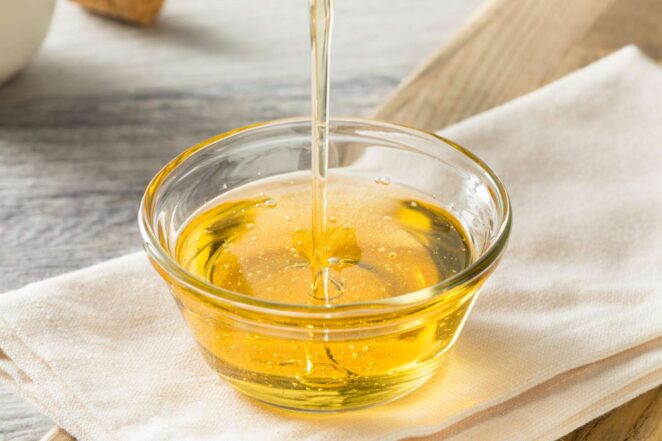
Agave nectar is from the agave plant. It is known for its low glycemic index, making it an excellent option for those monitoring their blood sugar levels. It has a mild, neutral flavor, making it versatile in various recipes, from beverages to baked goods. However, it’s important to note that agave nectar is still a concentrated sweetener and should be used in moderation.
Coconut Sugar
Coconut sugar has a familiar texture and flavor to brown sugar. It encompasses vitamins, minerals, and antioxidants while boasting a lower glycemic index than standard sugar, rendering it a more health-conscious option. For most recipes, you can seamlessly replace granulated sugar with coconut sugar.
Stevia
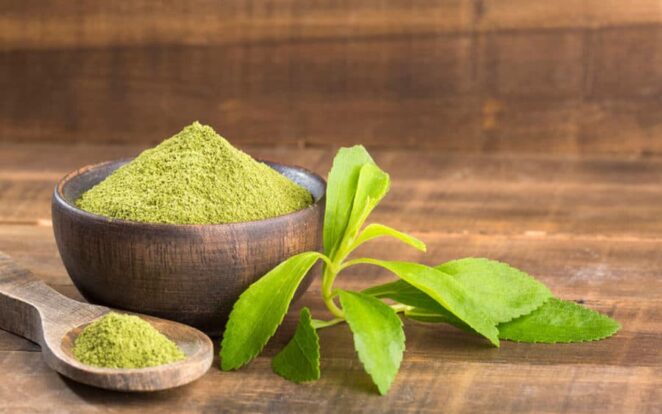
Stevia is sweet but has zero calories and a negligible effect on blood sugar levels. Stevia is available in various forms, including liquid drops and powdered extracts, making it easy to incorporate into your cooking and baking. Starting with a small amount is essential, as stevia can be much sweeter than sugar.
Date Paste
Date paste is made by blending dates with water to create a thick, sweet paste. Packed with fiber, vitamins, and minerals, date paste is a wholesome alternative for adding sweetness to recipes. Date paste is ideal for enhancing the flavor of smoothies, energy bars, and desserts, imparting a delightful caramel-like sweetness.
Molasses
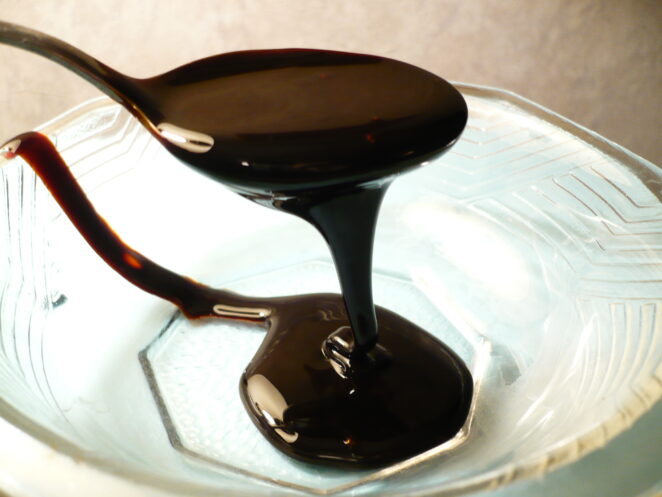
Molasses is a byproduct of sugar refining full of healthy minerals like iron, calcium, and magnesium. While it has a strong, robust flavor, it can add depth and complexity to recipes, such as gingerbread cookies or barbecue sauce.
Why Should I Use Natural Sweeteners?
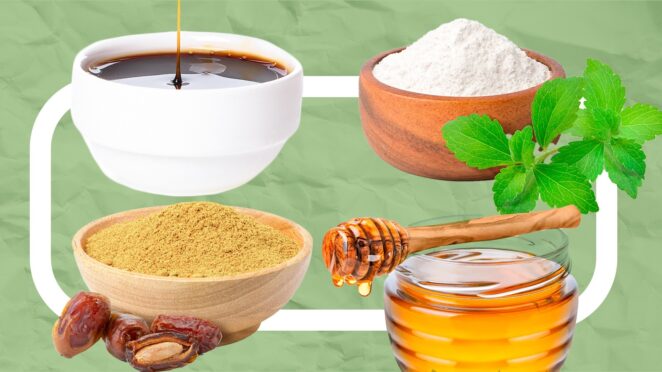
There are several reasons why you might consider using natural sweeteners in your cooking and dietary choices:
Healthier Alternative to Refined Sugars
Natural sweeteners are often considered a healthier option compared to refined sugars. They typically contain fewer processed chemicals and additives.
Lower Glycemic Index
Many natural sweeteners have a lesser glycemic index compared to refined sugars. It means they have a slower and steadier impact on blood sugar levels, which can benefit individuals with diabetes.
Fewer Calories
Natural sweeteners often contain fewer calories than traditional sugars, making them a better choice for those trying to reduce their calorie intake.
Potential Nutritional Benefits
Some natural sweeteners contain small amounts of vitamins, minerals, and antioxidants. While these nutrients are not present in significant quantities, they can contribute to your overall nutrient intake.
Less Processed
Natural sweeteners are typically less processed than refined sugars. They are derived from plants or other natural sources and undergo minimal processing, which can be appealing to those looking for more genuine and minimally processed foods.
Are Natural Sweeteners Suitable For People With Diabetes?
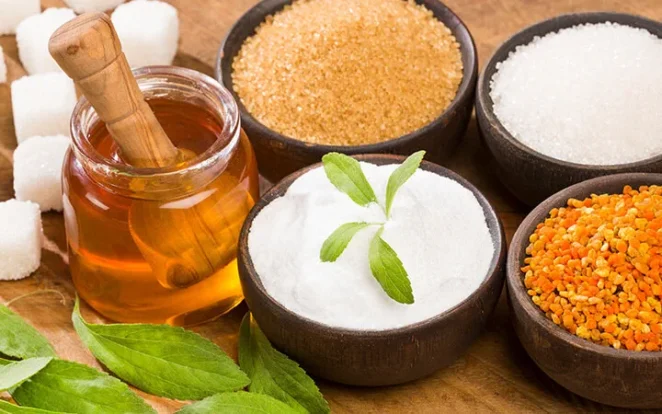
Natural sweeteners can be suitable for people with diabetes, but choosing and using them is essential. Here are some considerations for individuals with diabetes regarding natural sweeteners:
Glycemic Index (GI)
The glycemic index evaluates the speed at which a carbohydrate-rich food elevates blood sugar levels. Certain natural sweeteners, like stevia and monk fruit sweeteners, have a low glycemic index and can significantly influence blood sugar levels. These options could be more suitable for individuals managing diabetes.
Portion Control
Even natural sweeteners with a low glycemic index should be consumed in moderation. Adequate blood sugar management relies on the careful control of portion sizes. Consuming excessive sweeteners, including natural options, can result in sudden increases in blood sugar levels.
Carbohydrate Content
Pay attention to the carbohydrate content of natural sweeteners. While some are low in carbohydrates, others, like honey and maple syrup, contain carbohydrates that can affect blood sugar. It’s essential to account for these carbohydrates in your overall meal plan.
Individual Response
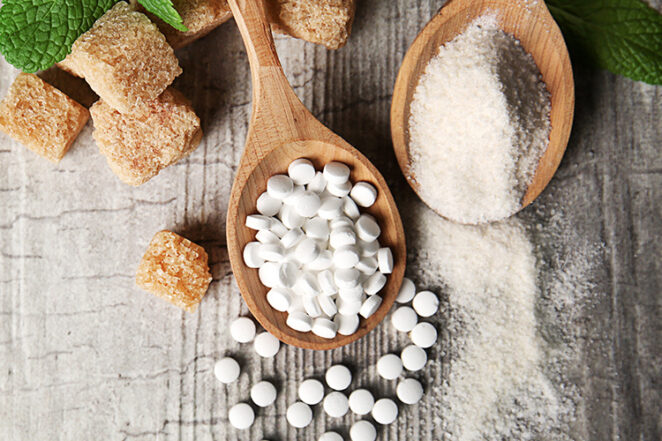
People with diabetes may respond differently to various sweeteners. For some people, specific natural sweeteners may exert a more pronounced influence on their blood sugar levels than others.
Consultation with a Healthcare Provider
If you have diabetes, it’s advisable to consult with a healthcare provider or registered dietitian. They can provide personalized guidance on incorporating natural sweeteners into your diet.
Avoid Added Sugars
Be cautious of products that claim to be “natural” but contain added sugars. Always read ingredient labels carefully to ensure you’re not unintentionally consuming added sugars that could affect your blood sugar levels.
Sugar Alcohols
Some natural sweeteners, like erythritol and xylitol, are sugar alcohols. While they have fewer calories and a minimal impact on blood sugar for most people, they can cause digestive discomfort in some individuals when consumed in large amounts.
Wrapping Up
As more people strive to make healthier choices in their diets, natural sweeteners are gaining popularity for their ability to provide sweetness without the drawbacks of refined sugar. Whether you’re looking to lower your sugar intake, manage blood sugar levels, or add variety to your cooking, these natural sweeteners offer a range of options to suit your needs. Experiment with different natural sweeteners in your recipes and discover new flavors while moving towards a healthier, more balanced diet. Remember that moderation is vital to maintaining overall health and well-being.




